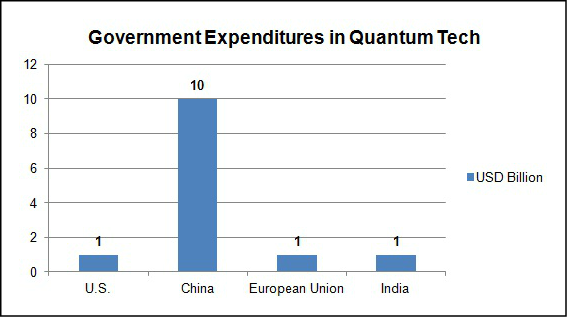The 2020 Indian Budget allocated Rs. 8,000 crore to the development of quantum tech over the next five years.[1] The amount will be used in the National Mission on Quantum Technologies & Applications (NM-QTA), with the Department of Science & Technology in charge of the mission. The mission will focus on aerospace engineering, weather predictions, secure communications and cybersecurity. The mention of cybersecurity in the budget speech[2] shows that now, at last, the Indian government is serious about protecting the nation’s cyber infrastructure, which is a critical component of quantum tech.
Why is quantum tech grabbing such attention from the Indian government? Two reasons: its disruptive nature in using subatomic particles to build futuristic computers and the new cyber risks that will emerge due to its ability to crack present-day encryption.
It is the new, new disruptive technology that leverages the properties of quantum physics to solve previously unsolvable problems. The most prominent application of quantum tech is quantum computing, which uses the properties of quantum physics for computation. Though the technology is still considered to be at a nascent stage, tech services provider IBM, at its Think 2019 Summit held at Taipei, indicated that commercial quantum computers will be available in the next three to five years.[3]
Quantum tech is the highest level of technology as its applications range across computing, communications, imaging, sensing and cryptography. India is playing catch up as the U.S. and China are already in fierce competition to gain quantum supremacy.
Quantum computers are foundationally different from classical computers. The fundamental unit of quantum computing is qubit or quantum bit, the smallest unit of data which uses the theory of superposition from quantum physics. Superposition allows an entity to simultaneously be in multiple states. Present-day computers operate on the principle of binary bits of 0 and 1, i.e., the smallest unit of data can be represented only in these two states. On the other hand, a qubit can be a superposition of both 0 and 1, meaning data can be represented in multiple states,[4] dramatically increasing the computing ability of a machine to solve complex problems.
More specifically, applications for quantum tech range from faster data analytics to metrology[5] to electric vehicles[6] to space research.[7] For instance, drug discovery will get a boost with the ability to mix and match an exponential number of molecular permutations[8].
Such extraordinary capability has its downside, and here, it is a cybersecurity vulnerability. India’s existing digital infrastructure can just about cope with cyber challenges; with quantum tech, it will need serious upgradation, especially the hardware infrastructure for this new system. Current encryption standards in India will also need to be upgraded because right now, encryption algorithms can be broken with quantum cryptography. For instance, the RSA encryption, a popular algorithm to convert data into cipher codes,[9] used by modern computers and the internet for secure communications, is considered unbreakable with existing technology. However, quantum tech will be able to crack such encryptions.[10]
Governments around the world, therefore, are investing in quantum tech because if only select countries have this prowess, it will be easier for them to hack into the digital infrastructure of other nations.
The weaponisation of cyber space will have a different dimension with quantum computing. National security issues are at the top of the agenda. For instance, the U.S.’ National Quantum Initiative Act,[11] passed in December 2018, describes itself as “An Act to provide for a coordinated Federal program to accelerate quantum research and development for the economic and national security of the United States.” The Act infused $1.2 billion into the U.S. federal government’s existing quantum programmes to accelerate research in quantum tech.
As per American whistleblower Edward Snowden’s leaked National Security Agency documents, the U.S is pursuing a research programme, named ‘Penetrating Hard Targets’,[12] whose aim is to build quantum computers with the potential to break current encryption technology. Apart from the U.S., the European Union launched a €1-billion Quantum Flagship programme in 2018[13] to build a quantum web, where all quantum applications are interconnected through a quantum communication network. Never far behind, China plans to open a National Laboratory for Quantum Information Sciences by 2020, a $10-billion investment,[14] which will enable the army to break cipher codes.
This is not a preoccupation for the governments alone. The global private tech industry also is focusing now on quantum computing. Both Google and IBM are ahead of the crowd. In January 2019, IBM unveiled the first commercial quantum computer, called Q System One,[15] which allows the usage of high processing power on the cloud. In October 2019, Google claimed quantum supremacy by unveiling its quantum computer, Sycamore,[16] which optimises the processing time of computer programmes.
Google has also partnered with the National Aeronautics and Space Administration (NASA) to create a joint public-private initiative, called Quantum AI lab (QuAIL),[17] with a focus on machine learning and Artificial Intelligence (AI) for advancing NASA’s aeronautics.[18] Microsoft’s research station, Q,[19] and Intel Labs, are other major U.S. players. In an extended model, IBM and Microsoft also facilitate collaboration between various stakeholders. Their respective collaborative platforms are called Q Network[20] and Quantum Network.[21]
In China, Damo Academy,[22] Alibaba’s R&D wing, is already working on quantum processors and quantum algorithms, presumably to build a quantum computer. Baidu Research,[23] the research arm of Baidu Inc., a search engine company, is following close behind.
In India, although a few government research institutions, like the Indian Institute of Science’s Initiative on Quantum Technology (IQT@IISc),[24] have quantum programmes, the Indian private tech sector is yet to catch up with it.
Budget 2020’s allocation to the NM-QTA is not the first step that India has taken. In 2017, a programme, called Quantum-Enabled Science & Technology (Qu-EST),[25] was begun by the Department of Science and Technology to facilitate research in the field of quantum computing. Qu-EST’s first meeting took place in January 2019 in Hyderabad. Some aspects of the security analysis of quantum computing were covered in Qu-EST’s proposal to the Department of Science & Technology, but it did not mention the fate of the existing computer infrastructure and its security.[26] Even so, this shows that the Indian government is taking cybersecurity seriously.
The Rs. 8,000-crore allocation is comparable with the amount being spent by advanced countries like the U.S.[27] The Indian tech industry has been at the forefront of software, but poor policies have meant that it never built commercial, popular hardware. This can now change. India’s private sector can start with being part of collaborating platforms, such as the IBM Q Network or Microsoft’s Quantum Network. With both public and private investment in quantum tech and research, India can hope to be part of the global quantum elite.
Sagnik Chakraborty is Researcher, Cybersecurity Studies, Gateway House.
This article was exclusively written by Gateway House: Indian Council on Global Relations. You can read exclusive content here.
For interview requests with the author, please contact outreach@gatewayhouse.in.
© Copyright 2020 Gateway House: Indian Council on Global Relations. All rights reserved. Any unauthorized copying or reproduction is strictly prohibited.
References
[1] Ministry of Finance, ‘Union Budget 2020-2021′, Government of India, https://www.indiabudget.gov.in/
[2] Ministry of Finance, ‘Union Budget 2020-2021′, Government of India, https://www.indiabudget.gov.in/
[3] Aaron Lee, Taipei & Willis, Ke, ‘IBM set to commercialise quantum computers in 3-5 years, says executive, Digitimes, 23 May 2019,
https://www.digitimes.com/news/a20190523PD205.html
[4] Google Research, ‘Quantum’, Google Research, https://research.google/teams/applied-science/quantum/
[5] Google Research, ‘Quantum’, Google Research, https://research.google/teams/applied-science/quantum/
[6] Garcia, Jeannette, ‘IBM and Daimler use quantum computer to develop next-gen batteries’, IBM, 8 January 2020,
https://www.ibm.com/blogs/research/2020/01/next-gen-lithium-sulfur-batteries/
[7] ‘Quantum Computing’, NASA Advanced Supercomputing Division, https://www.nas.nasa.gov/projects/quantum.html
[8] Accenture, ‘Biogen, 1QBit and Accenture: Pioneering Quantum Computing in R&D’, Accenture, https://www.accenture.com/in-en/success-biogen-quantum-computing-advance-drug-discovery
[9] Encryption Algorithm: A mathematical problem in the form of an algorithm to convert actual data into cipher codes
[10] Kirsch, Zach, ‘Quantum Computing: The Risk to Existing Encryption Methods’, Tufts University, 15 December 2015,
http://www.cs.tufts.edu/comp/116/archive/fall2015/zkirsch.pdf
[11] United States Congress, ‘H.R.6227 – National Quantum Initiative Act’, Government of United States, 2017-2018,
https://www.congress.gov/bill/115th-congress/house-bill/6227
[12] McMillan, Robert, ‘The NSA is Building a Quantum Computer? We Already Knew That’, Wired, 1 March 2018, https://www.wired.com/2014/01/hard-targets/
[13] https://www.nature.com/articles/d41586-018-07216-0
[14] Katwala, Amit, ‘Why China’s perfectly placed to be quantum computing’s superpower, wired, 14 November 2018, https://www.wired.co.uk/article/quantum-computing-china-us
[15] IBM Newsroom, ‘IBM Unveils World’s First Integrated Quantum Computing System for Commercial Use, IBM, 8 January 2019,
[16] Martinis, John, ‘Quantum Supremacy USing a Programmable Superconducter Processor, Google AI Blog, 23 October 2019,
https://ai.googleblog.com/2019/10/quantum-supremacy-using-programmable.html
[17] National Aeronautics and Space Administration, ‘NASA Quantum Artificial Intelligence Laboratory (QuAIL)’, NASA,
https://ti.arc.nasa.gov/tech/dash/groups/quail/
[18] National Aeronautics and Space Administration, ‘NASA Quantum Artificial Intelligence Laboratory (QuAIL)’, NASA,
https://ti.arc.nasa.gov/tech/dash/groups/quail/
[19] Warnick, Jennifer, ‘The Quest for a Quantum Future’, Microsoft, https://news.microsoft.com/stories/stationq/
[20] IBM Quantum, ‘Quantum Starts Here’, IBM, https://www.ibm.com/quantum-computing/
[21] ‘Quantum’, Microsoft, https://www.microsoft.com/en-us/quantum/quantum-network
[22] ‘Laboratories’, Alibaba Damo Academy,
https://damo.alibaba.com/labs/quantum
[23] Baidu Research, ‘Research Areas’, Baidu Research,
http://research.baidu.com/Research_Areas/
[24] Indian Institute of Science, ‘Initiative on Quantum Technology (IQT@IISc)’, Indian Institute of Science, https://www.iisc.ac.in/initiative-on-quantum-technologies/
[25] Ministry of Science & Technology, ‘Interdisciplinary Cyber Physical Systems (ICPS) Division’, Government of India,
https://dst.gov.in/sites/default/files/QuST%20-%20CFP1.pdf
[26] Ministry of Science & Technology, ‘Interdisciplinary Cyber Physical Systems (ICPS) Division’, Government of India,
https://dst.gov.in/sites/default/files/QuST%20-%20CFP1.pdf
[27] Ministry of External Affairs, ‘Indo-French Roadmap on Cybersecurity and Digital Technology, Government of India, 22 August 2019, ‘https://mea.gov.in/bilateraldocuments.htmdtl/31757/IndoFrench+Roadmap+on+Cybersecurity+and+Digital+Technology+August+22+2019



